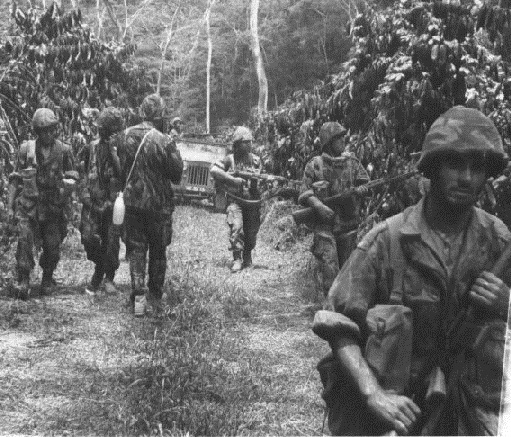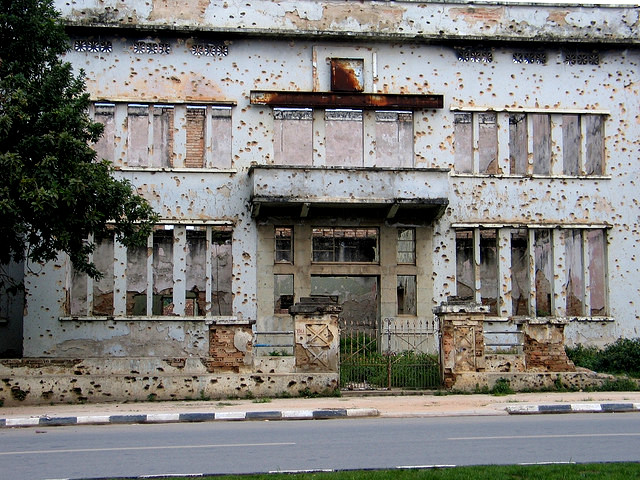Angola, a country of some 32 million people along the southwest coast of Africa, endured centuries as a colony of Portugal followed by long years of war to gain independence, then long years of civil war.

Portuguese troops on patrol in Angola. [Wikipedia]
In this late phase of the Cold War, the international community wanted to defuse flashpoints that could heat up the situation, such as former African colonies where superpowers supported opposite sides in civil strife.
The United Nations brokered an Angola peace agreement in 1988, culminating in national elections in the fall of 1992. The elections were overseen by the UN, which deployed 400 electoral observers who visited two-thirds of some 6,000 polling stations.
Canadian Major I.F. Somerville was posted to Cuemba, in remote central Angola.
“The election itself was run very smoothly and was a model for civil obedience.”
“It was a quiet, routine existence for the four UNMOS (UN monitors),” he is quoted in Canada’s Craftsmen at 50!, a history of the Canadian Armed Forces electrical and mechanical engineers.
“In one great show two days before the election, local officials of the two sides co-hosted a large rally. The election itself was run very smoothly and was a model for civil obedience.”
About 92 per cent of eligible voters—some 4.8 million Angolans—registered to vote in September parliamentary elections and the October presidential election. The ruling party secured 54 per cent of the total votes, UNITA 34 per cent, and the remainder was split among 10 other parties. Six more won no seats.
On Oct. 3, UNITA claimed massive voting fraud and prepared to go to war.
“There were violent clashes all across the country” recalled Somerville, “and this was occurring just as planned UN post-election reductions were starting. I was transferred to Luena to be operations officer for the region. The headquarters was short of staff, so I also became the communications officer and the transportation officer.”
“The soldiers opened fire indiscriminately in all directions.”
It was decided to close some outstations after artillery rounds landed within metres of the UN compound on Jan. 10, 1993.
“On the 14th, I went by helicopter to supervise dismantling of an outstation. As the helicopter was landing, confusion among UNITA troops caused a breakdown in control and the soldiers opened fire indiscriminately in all directions. It was a tense five minutes until order was restored and a dangerous situation defused.”

UNITA leader Jonas Savimbi. [Wikipedia]
“That morning, a Hercules came into the airport apron with engines running and ramp down. The headquarters staff loaded what they could as fast as possible. But with the sound of artillery near the airport, a crowd of almost 100 civilians and armed police stormed the plane. The ramp was lifted with most of the crowd on board but leaving some of the staff behind.
“I stayed back with the helicopter crew, the field force administrator and a Norwegian observer. We loaded the region’s radios and some office equipment onto the helicopter, refuelled from a stock of fuel which had been kept aside for such an emergency and left 10 hours later. The flight took over four hours. We supplemented the fuel with jet fuel from barrels on board.”
Somerville was among 14 Canadian peacekeepers immediately redirected to Mozambique, another former Portuguese colony that had endured long years of civil war. Their task was to disarm guerilla and government soldiers.
Angola endured two more decades of warfare. Much of the country’s infrastructure had been destroyed before the civil war came to an end in 2002. Elections since then have mostly been peaceful.

A bullet-pocked building in Huambo, Angola. [Wikipedia]
Advertisement


















